For an inspiring teacher retreat, focus on themes like wellness, collaboration, and innovative teaching strategies. Engage in activities like scavenger hunts and non-verbal communication games to enhance teamwork. Add creative outlets such as art classes or improvisational theater to promote self-expression and relieve stress. Incorporate mindfulness and physical activities to boost emotional well-being. Also, prioritize networking sessions to share experiences and challenges. Don't forget to gather participant feedback for future improvements. These ideas can ignite inspiration and foster growth. Stick around, and you'll uncover even more enriching activities to elevate your retreat experience.
Key Takeaways
- Incorporate wellness practices like yoga and mindfulness sessions to promote emotional well-being and reduce teacher burnout.
- Engage in collaborative projects such as mural painting to strengthen staff connections and foster a sense of community.
- Use creative problem-solving challenges, like "Balloon Tower," to enhance teamwork and innovative thinking among educators.
- Organize networking sessions, like "Struggle Bus," to share teaching challenges and collaboratively develop solutions.
- Include icebreaker activities, such as "Teacher Match Up," to facilitate personal connections and improve group dynamics.
Retreat Themes
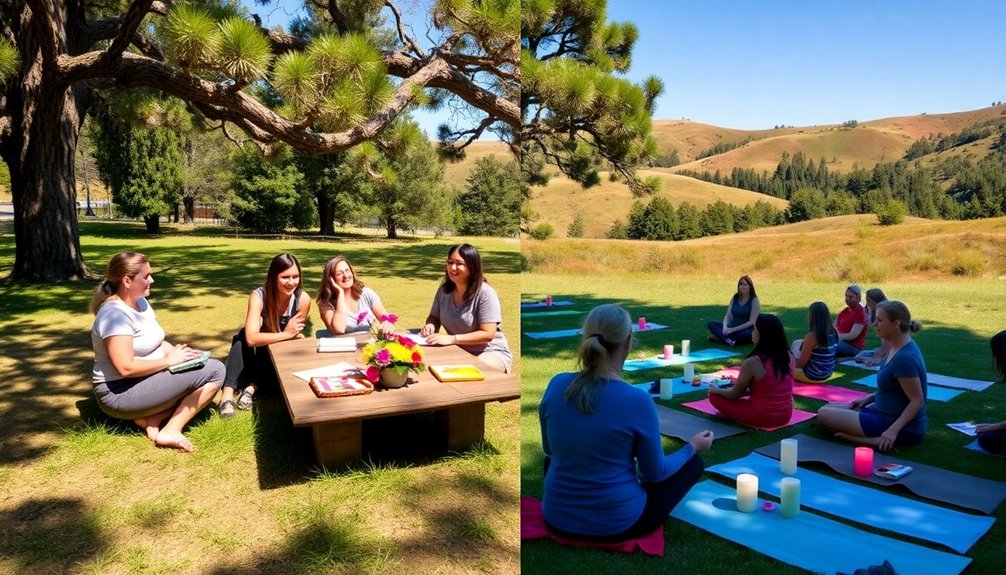
When planning a teacher retreat, consider choosing themes that resonate with your group's goals and needs. Focusing on collaboration and teamwork can enhance group dynamics, creating a supportive environment among educators.
You might also incorporate wellness and self-care themes to address teacher burnout, promoting mental and emotional health. If you're looking to nurture future leaders, a leadership development theme can equip participants with essential management skills.
For those interested in creativity, innovative teaching strategies can inspire new methods in the classroom. Finally, consider a cultural competency theme to promote inclusivity, helping educators embrace diversity within their student populations.
Each theme can guide your retreat activities and serve as the foundation for impactful team building activities.
Engaging Team Activities
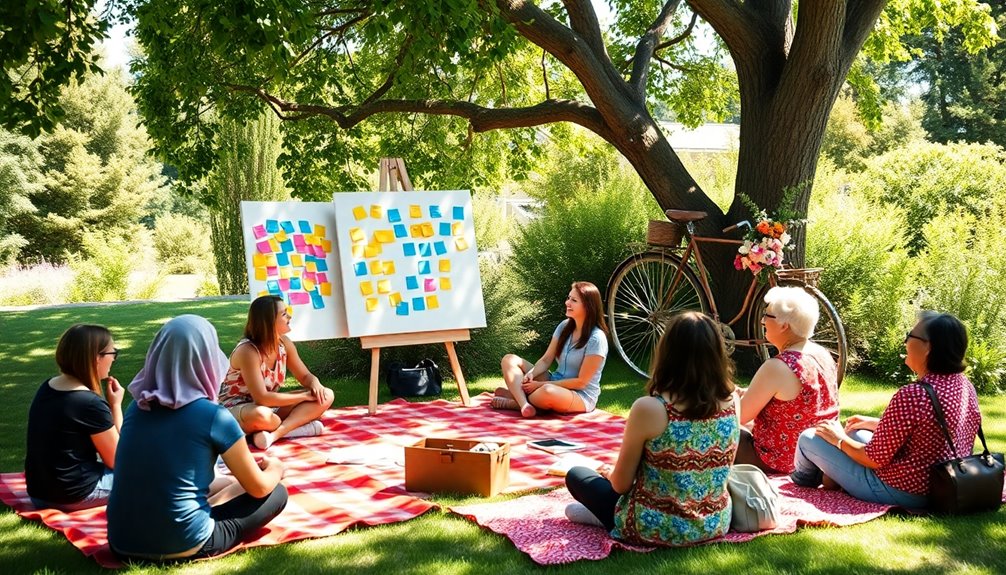
Choosing the right theme sets the stage for meaningful interactions, but it's the engaging team activities that truly bring those themes to life. Incorporate activities like scavenger hunts and collaborative storytelling to foster stronger interpersonal relationships and enhance communication among staff.
Try "Jump In and Jump Out" or "Last Name Line Up" to promote non-verbal communication and build trust. Creative problem-solving challenges, such as "Balloon Tower" and "Play with Clay," encourage innovation and teamwork as groups strategize to achieve goals.
Fun icebreakers like "Teacher Match Up" help participants learn personal insights, fostering camaraderie. Finally, unique projects like creating a "Silly School Calendar" allow teams to express their teaching themes creatively while enhancing collaboration through teamwork.
Creative and Artistic Engagements

Creative and artistic engagements can transform a teacher retreat into a memorable experience that nurtures self-expression and collaboration. Activities like art classes or crafts encourage you to explore your creative side while promoting relaxation.
Collaborative projects, such as mural painting or collective storytelling, serve as fantastic team-building exercises that strengthen connections among staff members. You can also immerse yourself in creative problem-solving activities, like improvisational theater or design challenges, which stimulate innovative thinking and enhance group dynamics.
Personalized creations, such as photo sessions or craft workshops, give you a chance to reflect on your identity within the educational community. These engagements not only foster creativity but also build lasting bonds that enrich your teaching journey.
Wellness and Self-Care Practices

After exploring creative and artistic engagements, it's important to focus on wellness and self-care practices that can rejuvenate teachers and enhance their effectiveness in the classroom. Incorporating mindfulness and stress management techniques considerably reduces burnout, improving emotional well-being by up to 30%. Yoga, meditation, and physical activities like hiking boost mood and satisfaction, while workshops on time management equip you with practical strategies for balancing personal wellness and professional development. Additionally, embracing continuous learning can further empower teachers to thrive in both their personal and professional lives.
| Activity | Benefits | Suggested Frequency |
|---|---|---|
| Yoga/Meditation | Reduces anxiety and enhances clarity | Daily or Weekly |
| Physical Activities | Boosts endorphins and mood | Weekly or Bi-weekly |
| Reflection Sessions | Fosters self-awareness | Every Retreat Session |
Off-Campus Adventures

While off-campus adventures might seem like just a fun break, they play an important role in building strong relationships among teachers. Engaging in activities like laser tag or adventure sports fosters excitement and camaraderie, enhancing team dynamics.
Volunteering together not only strengthens teamwork but also builds community connections, giving you a shared sense of purpose.
Outdoor pursuits such as hiking or camping promote physical wellness while allowing you to bond with colleagues in nature.
Creative activities, like cooking or art classes, stimulate collaboration and innovation, equipping you with new skills to share in your classrooms.
It's vital to guarantee these retreats are inclusive, catering to diverse interests and abilities, so everyone feels encouraged to participate and connect. Additionally, participating in team-building activities can help improve group cohesion and communication skills.
Workshops for Professional Growth
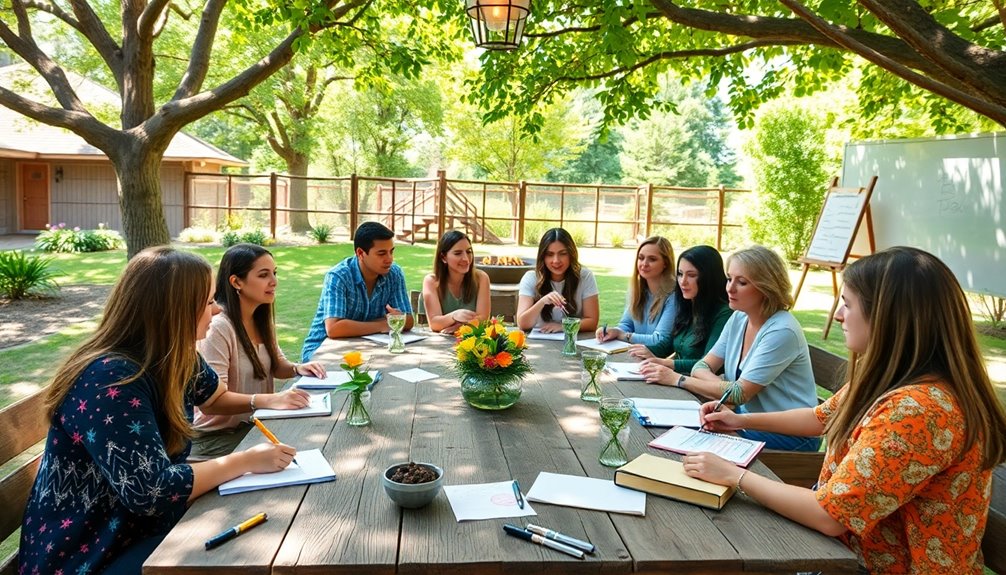
When you think about professional growth, workshops can offer valuable tools to enhance your skills.
Stress management techniques can help you tackle burnout, while innovative teaching strategies can boost student engagement.
Additionally, leadership development workshops prepare you for future roles and strengthen your impact in the classroom.
Leadership Development Strategies
Leadership development workshops are essential for fostering professional growth among educators, as they provide practical tools and strategies for effective leadership.
These workshops often include interactive sessions on effective communication, decision-making, and conflict resolution, enhancing your ability to lead diverse teams. Engaging in building activities and scenario-based training allows you to practice real-world challenges, improving your problem-solving skills and adaptability.
Incorporating tools like the StrengthsFinder assessment helps you identify your leadership strengths, fostering collaboration among team members. Additionally, workshops focusing on emotional intelligence enable you to connect better with students and colleagues, contributing to a positive school climate.
Implementing follow-up strategies, such as peer mentoring and regular check-ins, reinforces learned concepts and promotes continuous professional growth.
Innovative Teaching Techniques
Innovative teaching techniques are essential for enhancing student engagement and fostering a dynamic learning environment. By collaborating with your team, you can explore various activities that cater to diverse learning styles. Here are some key techniques to evaluate:
| Technique | Benefits |
|---|---|
| Project-Based Learning | Solves real-world problems |
| Technology Integration | Enhances engagement through apps |
| Differentiated Instruction | Meets diverse learning needs |
| Flipped Classroom | Boosts motivation with hands-on work |
| Social-Emotional Learning | Supports emotional well-being |
Incorporating mindfulness techniques can also enhance teachers' ability to connect with students and create a supportive classroom atmosphere.
Stress Management Workshops
Educators often face unique challenges that can lead to significant stress, making stress management workshops an essential resource for professional growth.
These workshops offer techniques like mindfulness, meditation, and breathing exercises, which have been shown to reduce stress levels by over 30%. They also include practical tools such as time management strategies and self-care routines, helping you balance your responsibilities more effectively.
Participating regularly can lead to a 25% decrease in teacher burnout, improving retention rates in the profession. Furthermore, engaging with your teams in group discussions fosters a supportive community where you can share best practices and learn from one another.
Ultimately, these workshops enhance your emotional resilience, equipping you to create a more positive classroom environment.
Networking and Relationship Building

Networking and relationship building are essential at teacher retreats, and icebreaker activities can kickstart those connections.
You'll find that collaborative networking sessions allow you to share ideas and resources with fellow educators, enhancing your teaching practices.
Icebreaker Activities
How can you create a welcoming atmosphere at your teacher retreat? Start with engaging icebreaker activities that encourage team members to interact and build relationships right away. For example, try "Teacher Match Up," where participants pair items using yes/no questions, or "Struggle Bus," which invites teachers to share common challenges in a light-hearted way. These activities foster camaraderie and open the door for deeper discussions.
| Activity | Purpose |
|---|---|
| Teacher Match Up | Promote communication and fun |
| Struggle Bus | Share challenges and coping strategies |
| Icebreaker Questions | Build personal insights and connections |
Collaborative Networking Sessions
Building on the connections made during icebreaker activities, collaborative networking sessions serve as a powerful way for teachers to share insights and practices that can elevate their teaching.
These sessions foster a culture of continuous improvement, encouraging educators to engage deeply with their peers. Here are some effective strategies for maximizing these sessions:
- Speed networking: Quickly discuss experiences and challenges to build relationships efficiently.
- Breakout groups: Focus on shared interests or subjects, promoting deeper conversations and collaboration.
- Digital platforms: Use online tools to maintain connections and share resources long after the retreat.
Additionally, these interactions can lead to access to diverse perspectives, which enhances collective problem-solving and personal growth among educators.
Effective Planning Strategies
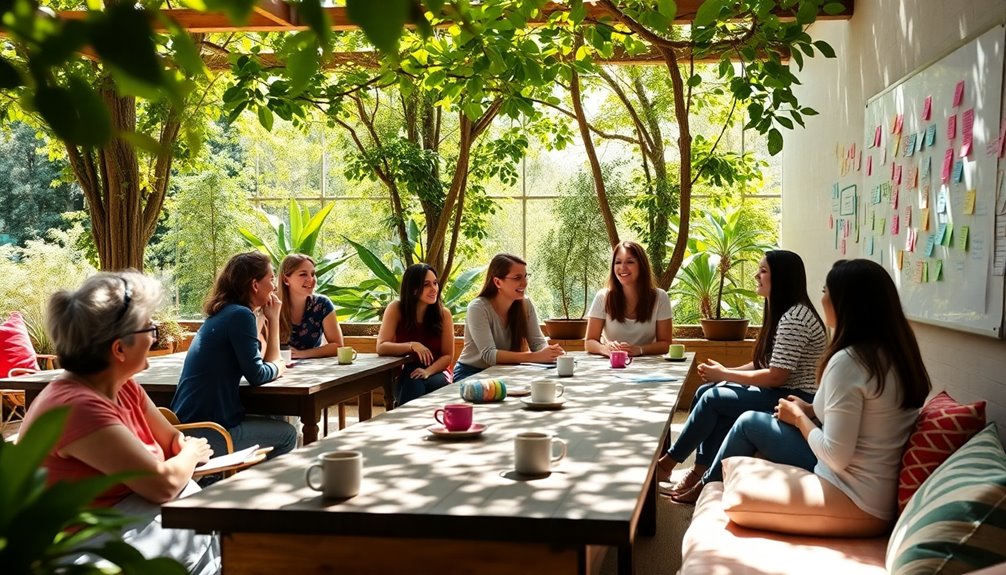
To guarantee a successful teacher retreat, it's essential to start with clear objectives that define the purpose of the event. Identify whether you want to focus on team building, professional development, or a mix of both. This clarity will guide your planning and make sure activities align with your desired outcomes.
Utilize effective planning strategies by creating a balanced schedule that includes structured workshops and free time for informal networking. Choose a serene, accessible venue that enhances the retreat's theme and offers necessary amenities.
Finally, incorporate participant feedback from previous retreats to refine your approach, making certain the event meets staff needs and fosters continuous improvement. With these steps, your retreat can inspire growth and collaboration among teachers.
Budgeting for Your Retreat
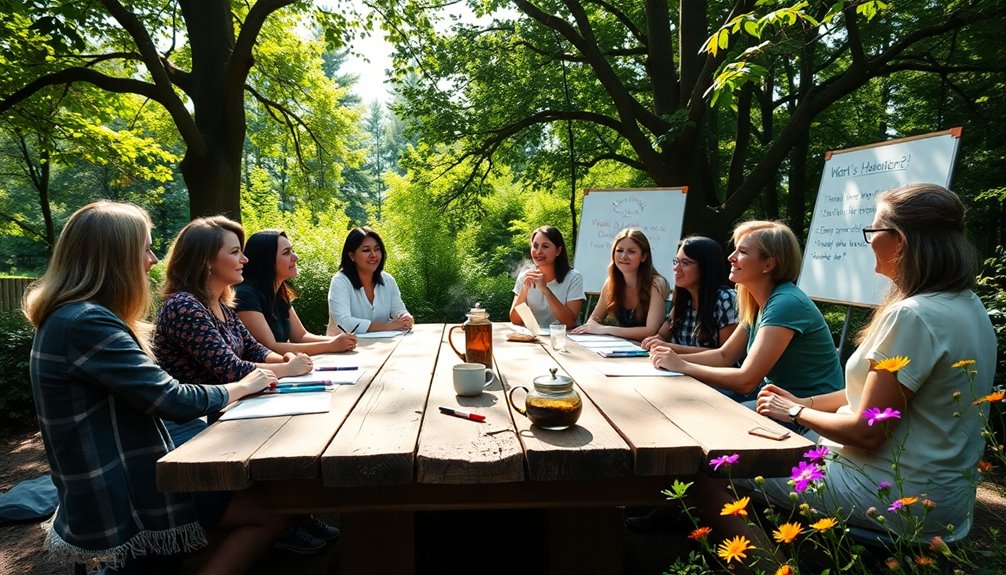
Budgeting for your retreat is essential in ensuring a successful and stress-free experience. Start by itemizing all potential expenses, including venue costs, materials, meals, and transportation.
Allocate 20-30% of your budget for unexpected expenses, allowing flexibility for any last-minute needs. To stretch your resources further, consider these tips:
- Seek sponsorships or partnerships with local businesses to offset costs.
- Utilize existing school resources like facilities and equipment to minimize expenses.
- Track all expenses closely with spreadsheets or budgeting software to stay on target. Implementing effective cost behavior analysis can help you better understand your spending patterns and identify areas for improvement.
Follow-Up and Implementation

After organizing your retreat and managing expenses, it's time to focus on how to make the most of the experience. Start by developing action plans that outline specific strategies and goals for implementation. These plans will help translate insights gained during the retreat into practical applications.
Schedule regular check-ins, like monthly or quarterly meetings, to assess progress and provide ongoing support. Establish a feedback mechanism, such as surveys or discussion groups, to evaluate the retreat's effectiveness and gather suggestions for improvement.
Encourage staff to share best practices through collaborative platforms or workshops, fostering a culture of continuous learning. Additionally, integrating mindfulness practices into the retreat can enhance participants' overall well-being. Finally, use the feedback collected to plan future retreats that address emerging needs, ensuring they remain relevant and impactful for everyone involved.
Frequently Asked Questions
How Do You Make a Retreat Fun?
To make a retreat fun, you'll want to incorporate interactive games and team-building activities that get everyone engaged.
Consider adding creative sessions like art classes or cooking challenges for self-expression. Light-hearted icebreakers can help attendees share personal stories, fostering connections.
Don't forget to include inspiring speakers or motivational talks to spark discussions.
Finally, balance the fun with wellness sessions, like yoga or mindfulness, ensuring everyone leaves feeling refreshed and energized.
What Are Activities for Teachers?
When you think about activities for teachers, consider team-building exercises that boost collaboration, like scavenger hunts or rope challenges.
You might also enjoy mindfulness activities that promote reflection and discussions on your school environment.
Get creative with problem-solving tasks, such as building balloon towers.
Don't forget storytelling exercises to enhance narrative skills and foster community.
Finally, icebreaker games can help you connect personally with colleagues, encouraging open dialogue and shared insights.
How Do You Plan a Successful Staff Retreat?
"Failing to plan is planning to fail."
To plan a successful staff retreat, start by defining clear objectives and desired outcomes.
Choose a venue that encourages relaxation and teamwork.
Incorporate diverse activities, like workshops and reflection sessions, to engage everyone.
Don't forget to budget for all expenses and consider sponsorships.
Finally, implement a follow-up strategy to assess effectiveness and keep the momentum going long after the retreat ends.
What Is a Retreat Activity?
A retreat activity is an organized experience designed to encourage personal and professional growth.
You might participate in team-building exercises, workshops, or creative challenges that promote engagement and reflection.
These activities often aim to improve group dynamics and build trust among participants.
Conclusion
As you wrap up your teacher retreat, remember that the real growth happens when you leave the cozy conference room for the chaos of the classroom. Isn't it ironic? You spend all this time planning for inspiration, only to find that the true spark ignites when you're juggling lesson plans and student questions. Embrace the whirlwind, and let those retreat ideas bloom in the everyday challenges. After all, the best lessons often come from the most unexpected places.








